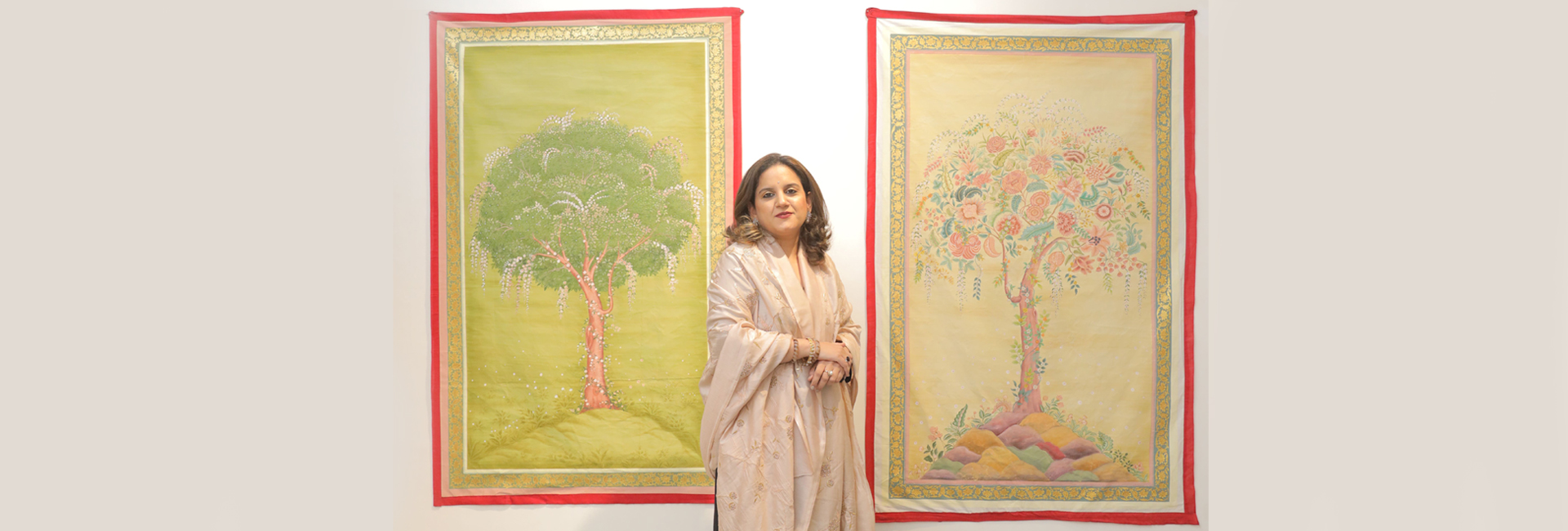(June 23, 2024) Creating a tea estate experience and running a boutique hotel, Husna-Tara Prakash’s philosophy is based on sustainability and an immersive experience.
Husna-Tara Prakash and her sister were born in England and as teenagers, studied in India, because their parents wanted them to get to know India better. She recalls, “Our parents wanted us to get familiar with our roots in India. I studied for six years at the Welham Girls School in Dehradun. Those years moulded me, and the friends I made there are the ones I am closest to even today. Then, after my final two years of school, back in the UK, I took a year off before college and went backpacking around the world – where I met my husband, Anshuman Prakash. We dated for six years – this was before emails and mobile phones. During that time, I got a degree in pharmacology and a post-grad in education from Cambridge University, as I wanted to become a teacher.”

Husna-Tara Prakash
A Legacy of Tea
Husna-Tara’s husband hails from a family that owned tea plantations, so at 25, she moved back to India, got married and the rest, as they say, is history. The Prakash family had inherited a tea estate in Assam from their extended family who owned around 30 estates at one stage. They added another in Kerala for many years, sold that, and took over Glenburn in Darjeeling in 2001. From then on, it was as if destiny guided Husna towards creating the businesses and brands that are synonymous with luxury today. “It was beautiful. There was a 1000-acre forest and two rivers which guests could visit. It led us to think of creating a space like the vineyards in Europe and provide a similar experience. I coincidentally met Bronwyn Latif, an interior designer, in Delhi at a horse-riding show. We decided to experiment with the idea of a boutique hotel at the estate. At that time, the original bungalow had only four rooms,” she tells Global Indian.
Husna-Tara and Bronwyn were not short on ideas and they saw ample potential in the place. Says Husna-Tara, “All the previous residents had left huge footprints on the place. I knew nothing about hospitality, but I wanted to restore the place to its original form of a plantation bungalow. We pulled off the ugly layers down to their bare bones. We had a local team to help. Once it was set up, I would meet with travel agents to promote the property every time I went to England. I’d pick up antique crockery on each of my trips. We also sourced antique furniture for the interiors.”

The Glenburn Tea Estate took shape and was launched in 2002 with four rooms. The main house is known as the Burra Bungalow. Over time, they added four rooms to what is called The Water Lily Bungalow. The place spells luxury, and offers stunning views of the town and the Himalayas. Glenburn is situated on top of a hill, near the River Rungeet, with the awe-inspiring Kanchenjunga overlooking the hillocks below. The entire estate is spread over 1600 acres and has tea gardens, forests, and rivers. There are plenty of activities the guests can partake in, from bonfire barbecues to treks, bird-watching, river paddling and more.
Giving Back, Generously
Husna-Tara is particular about sustainability and carbon footprints. The cuisine and creating the menu were the least challenging aspects, she says. “We use local produce only. The Himalayan trout and other local fish, and vegetables we procure locally. We also grow our herbs, some spices and several fruits and vegetables on the property itself. The cheese we use is the Kalimpong cheese, made in the region.”
Glenburn Tea Estate gives you an experience that includes treks, bird-watching, tea harvesting and gourmet food. The tariff is a bit on the higher side but she reiterates that it is value for money since it includes everything. From the airport pick-up or wherever you are coming from in the region, to all the meals, lavish dinners and activities are part of the package. Even laundry, GST and day trips to Kalimpong and Darjeeling are included.

The hotel’s success and its guests from all parts of the world have empowered the locals too. Especially since Husna-Tara is particular about hiring local staff and giving back to the community. She says, “We have 4000 workers who live within the tea estate. All my staff are from local villages and I don’t believe in hiring trained people. We support three government schools, and for the children of the staff and the estate, launched a scholarship programme that has enabled more than 60 of them to study at private schools.”
On the environment front, Glenburn is certified by the Rainforest Alliance, where it got 100 per cent for wildlife protection and community engagement. The local flora and fauna are protected within the forest and Husna-Tara ensures they are not harmed. There is also a music and dance academy that promotes the local culture of the Nepali community residing in Darjeeling.
An Uber Luxe Experience
Despite high tariffs, the tea estate’s eight rooms are booked out well in advance, sometimes even a year earlier. It was the curiosity of these very guests, who had questions galore about India’s colonial past and Kolkata’s history that led to Husna-Tara setting up one more luxury property, in Kolkata, which took seven years to complete. A penthouse boutique hotel called The Glenburn Penthouse, with nine rooms, has spectacular views of the Victoria Memorial, Eden Gardens, Fort William, the Governor’s Palace and the Calcutta Turf Club etc. It offers a curated experience, guided historic tours, and a bespoke menu created by the British-born chef Shaun Kenworthy. There is also a café that is open to all.

Despite no prior experience in hospitality, Husna has steered the Glenburn Estate to excellence, with many credits to its name. It is listed in the Tatler travel guide to the best 101 hotels in the world. Glenburn was also awarded the best luxury hill resort in India in 2018 by Outlook Traveller, and the gold award for the most responsible hotel in India in 2020 by the Indian Responsible Tourism Awards, and the tenth best boutique hotel in Asia by Smart Travel Asia in 2016 among others.
Her children grew up on the estate during the time she was renovating it, reveals Husna-Tara, though they are now studying at boarding school. Work-life balance is something she struggles with as she works remotely and is available for her team 24×7. Her main focus is on maintaining the quality and delivering on what she promises. For her, Glenburn is and always will be a labour of love. One that will be her legacy to the city of Kolkata, the hills and tea estates.




